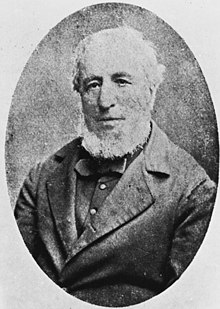Edward Davy
Edward Davy | |
|---|---|
 | |
| Born | 16 June 1806 Ottery St Mary, Devon, England |
| Died | 26 January 1885 (aged 78) |
| Nationality | British |
| Known for | Telegraphy |
| Scientific career | |
| Fields | Physics |
Edward Davy (16 June 1806 – 26 January 1885) was an English physician, scientist, and inventor who played a prominent role in the development of telegraphy, and invented an electric relay.[1]
Davy was born in Ottery St Mary, Devonshire, England, son of Thomas Davy (medical practitioner and house surgeon at Guy's Hospital, London). Edward Davy was educated at a school run by his maternal uncle in Tower Street, London. He was then apprenticed to Dr C. Wheeler, house surgeon at St Bartholomew's Hospital.[2] Davy won the prize for botany in 1825, was licensed by the Worshipful Society of Apothecaries in 1828 and the Royal College of Surgeons in 1829.[2] Soon after graduating, Davy began trading as an operative chemist under the name of Davy & Co. In 1836 he published a small book Experimental Guide to Chemistry, at the end of which was a catalogue of goods supplied by his firm.[1][2]
Davy published Outline of a New Plan of Telegraphic Communication in 1836 and carried out telegraphic experiments the following year. He demonstrated the operation of the telegraph over a mile of wire in Regent's Park.[1] In 1837 he demonstrated a working model of the telegraph in Exeter Hall. He was granted a patent for his telegraph in 1838.[3] However, he was soon obliged to drop his investigations of telegraphy for personal reasons. His patent was purchased by the Electric Telegraph Company in 1847 for £600.[3] Davey also invented an electric relay. He used a magnetic needle which dipped into a mercury contact when an electric current passed through the surrounding coil. In recognition of this he was elected in 1885 as an honorary member of the Society of Telegraph Engineers and was informed of this by telegraph shortly before his death.[1]
In 1838 Davy migrated to South Australia without his first wife and son. He was editor of the Adelaide Examiner from June to July 1842 and was elected president of the Port Adelaide Mechanics' Institute at its inaugural meeting in 1851.[1] Davy was a director and manager of the Adelaide Smelting Company and became chief assayer of the Government Assay Office in Adelaide in February 1852.[1]
Davy was appointed assay master in Melbourne in July 1853[2] until the office was abolished in October 1854. For a short while, he took up farming near Malmsbury, Victoria then moved into Malmsbury where he practised as a physician for the rest of his life. He was three times mayor of Malmbury.[1]
References
- ^ a b c d e f g Gibberd, William (1966). "Edward Davy". Australian Dictionary of Biography. Canberra: National Centre of Biography, Australian National University. ISBN 978-0-522-84459-7. ISSN 1833-7538. OCLC 70677943. Retrieved 31 August 2014.
- ^ a b c d Serle, Percival (1949). "Edward, Davy". Dictionary of Australian Biography. Sydney: Angus & Robertson. Retrieved 31 August 2014.
- ^ a b "Edward Davy". Australian Science Archives Project. Retrieved 7 June 2012.
External links
- Biography from the Institution of Engineering and Technology.
- Biography from AIM25 (Archives in London and the M25 area)
- Copyrighted photograph from the State Library of South Australia.
- Obituary notice in The Argus from National Library of Australia archive
